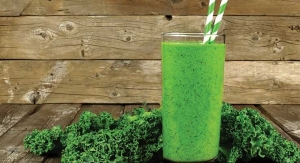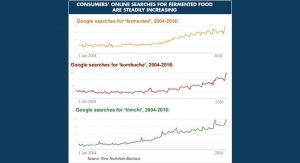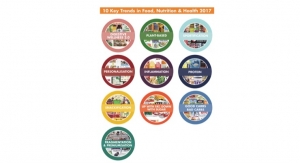09.30.15
Seaweed is a rare example of an opportunity to get in at Day One of a new growth market
for snacks, predicts New Nutrition Business, with sales of seaweed snacks in the U.S. already overtaking those of kale.
“Launches of seaweed snack products are proliferating and sales outstrip those of kale, the trendy green vegetable that has benefited from a huge degree of hype since 2010 and has been embraced by young health-conscious urban consumers,” said Julian Mellentin, director of New Nutrition Business, which outlines five steps to creating a successful seaweed snack in a new report. “Seaweed’s transition from the food fringes to mainstream will be propelled by snack products,” he added.
In the U.S., retail sales of seaweed snacks were valued at over $250 million in 2014, a year when market growth was around 30%, and the last two years have seen a surge in launches of snack products with seaweed.
Long a favorite of health-conscious consumers on the food fringes, seaweed’s “naturally functional” advantages—it’s a low-calorie source of protein and fiber, richer in trace minerals and vitamins than kale, and it ticks a number of free-from boxes—are winning it wider attention.
“Seaweed is a naturally-healthy plant-based ingredient, with a range of natural nutritional advantages and impeccable sustainability credentials,” said Mr. Mellentin. “These features are gaining it growing media coverage, and the attention of health-conscious consumers who are looking for an interesting new snack.”
In response to this growing consumer interest, snack brands have started to include seaweed in existing products, such as seaweed-flavored rice chips, and there are also totally new brands that use a variety of seaweed types in inventive formats.
The new report sets out five steps to best position, market, price and distribute seaweed snacks in the U.S. and Europe. The report provides practical insights for companies large or small aiming to create a successful seaweed snack brand. Snapshots of key brands provide real-world examples of products, marketing and communications for seaweed snacks.
“Launches of seaweed snack products are proliferating and sales outstrip those of kale, the trendy green vegetable that has benefited from a huge degree of hype since 2010 and has been embraced by young health-conscious urban consumers,” said Julian Mellentin, director of New Nutrition Business, which outlines five steps to creating a successful seaweed snack in a new report. “Seaweed’s transition from the food fringes to mainstream will be propelled by snack products,” he added.
In the U.S., retail sales of seaweed snacks were valued at over $250 million in 2014, a year when market growth was around 30%, and the last two years have seen a surge in launches of snack products with seaweed.
Long a favorite of health-conscious consumers on the food fringes, seaweed’s “naturally functional” advantages—it’s a low-calorie source of protein and fiber, richer in trace minerals and vitamins than kale, and it ticks a number of free-from boxes—are winning it wider attention.
“Seaweed is a naturally-healthy plant-based ingredient, with a range of natural nutritional advantages and impeccable sustainability credentials,” said Mr. Mellentin. “These features are gaining it growing media coverage, and the attention of health-conscious consumers who are looking for an interesting new snack.”
In response to this growing consumer interest, snack brands have started to include seaweed in existing products, such as seaweed-flavored rice chips, and there are also totally new brands that use a variety of seaweed types in inventive formats.
The new report sets out five steps to best position, market, price and distribute seaweed snacks in the U.S. and Europe. The report provides practical insights for companies large or small aiming to create a successful seaweed snack brand. Snapshots of key brands provide real-world examples of products, marketing and communications for seaweed snacks.



















